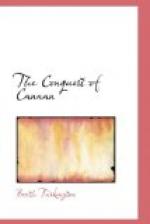“`It is generally admitted that after yesterday’s sitting of the court, the prosecution in the Fear-Cory murder trial has not a leg to stand on. Louden’s fight for his client has been, it must be confessed, of a most splendid and talented order, and the bottom has fallen out of the case for the State, while a verdict of Not Guilty, it is now conceded, is the general wish of those who have attended and followed the trial. But the most interesting event of the day took place after the session, when some miscreants undertook to mob the attorney for the defence in the Court-house yard. He met the attack with a coolness and nerve which have won him a popularity that—’ " Mrs. Flitcroft again faltered.
“Go on,” repeated the Colonel. “There’s a great deal more.”
“Look at the editorials,” suggested Norbert. “There’s one on the same subject.”
Mrs. Flitcroft, her theory of the Tocsin’s sarcasm somewhat shaken, turned the page. “We Confess a Mistake” was the rubric above the leader, and she uttered a cry of triumph, for she thought the mistake was what she had just been reading, and that the editorial would apologize for the incomprehensible journalistic error upon the first page. “`The best of us make mistakes, and it is well to have a change of heart sometimes.’ " (Thus Eugene’s successor had written, and so Mrs. Flitcroft read.) “`An open confession is good for the soul. The Tocsin has changed its mind in regard to certain matters, and means to say so freely and frankly. After yesterday’s events in connection with the murder trial before our public, the evidence being now all presented, for we understand that neither side has more to offer, it is generally conceded that all good citizens are hopeful of a verdict of acquittal; and the Tocsin is a good citizen. No good citizen would willingly see an innocent man punished, and that our city is not to be disgraced by such a miscarriage of justice is due to the efforts of the attorney for the defendant, who has gained credit not only by his masterly management of this case, but by his splendid conduct in the face of danger yesterday afternoon. He has distinguished himself so greatly that we frankly assert that our citizens may point with pride to—’ " Mrs. Flitcroft’s voice, at the beginning pitched to a high exultation, had gradually lowered in key and dropped down the scale till it disappeared altogether.
“It’s a wonder to me,” the Colonel began, “that the Tocsin doesn’t go and hold Joe Louden’s hand.”
“I’ll read the rest of it for you,” said Norbert, his heavy face lighting up with cruelty. “Let’s see—where were you? Oh yes—`point with pride’? `Our citizens may point with pride to . . .’ "
Let us not linger to observe the unmanly behavior of an aged man and his grandson left alone at the breakfast-table by a defenceless woman.
The Tocsin’s right-about-face undermined others besides Mrs. Flitcroft that morning, and rejoiced greater (though not better) men than the Colonel. Mr. Farbach and his lieutenants smiled, yet stared, amazed, wondering what had happened. That was a thing which only three people even certainly knew; yet it was very simple.




